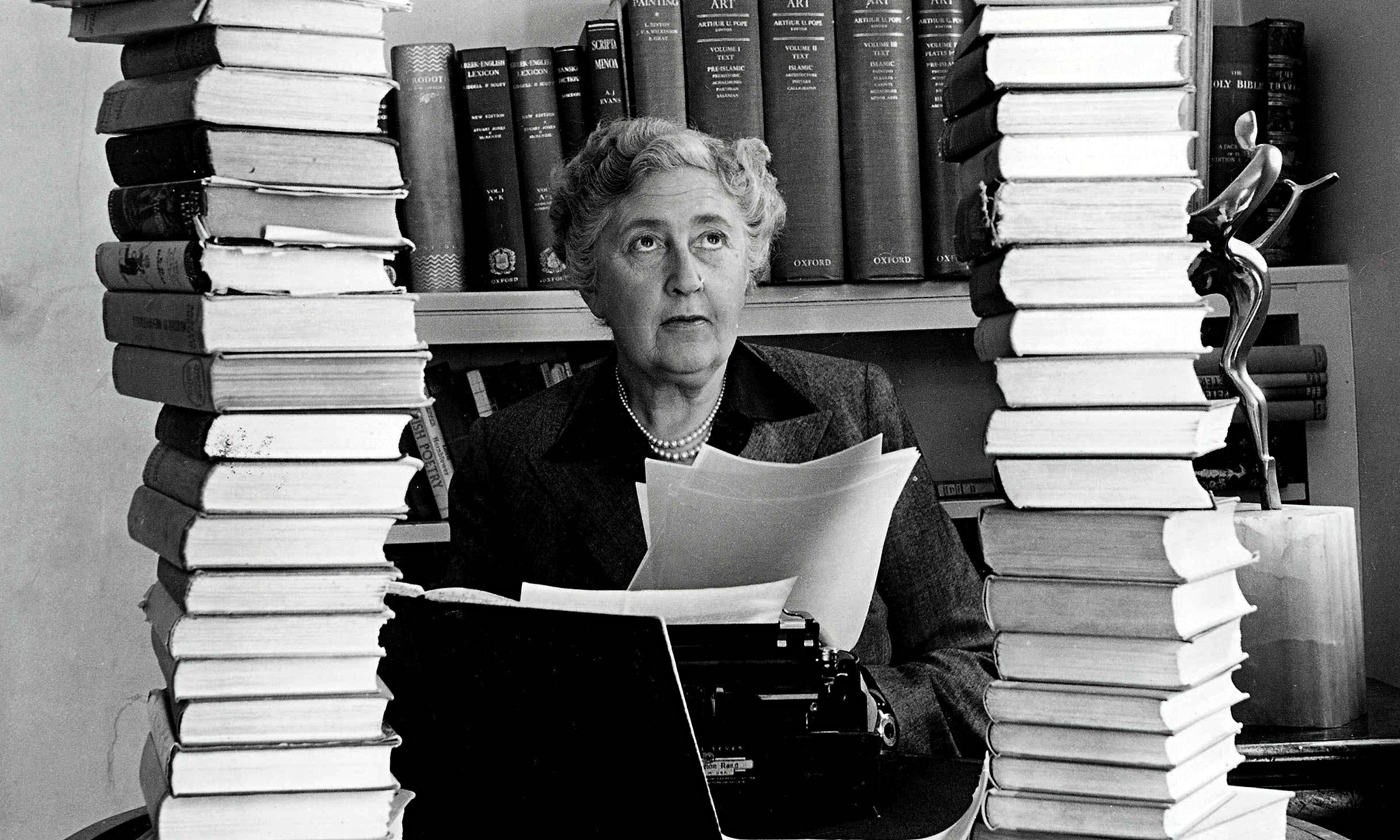Mozart's Sonata for Violin and Piano in F K376 is playing in the background as I review two very different books for my latest blog post. This is going to take a little longer than normal since I sliced my ring finger while cutting vegetables. The bulky bandage my poor finger is sporting allows me use of only the pointer finger but so far I'm getting along passably without too many mistakes.
Agatha Christie's novels are different than her short stories, or any short mystery stories. In the short story version of murder mysteries, the fatal occurrence happens almost immediately with a quick overview of clues and possible motives before sliding into home and ta da! Mystery solved.
In Christie's novels, almost half the novel is used to develop the characters almost to where one forgets he is reading a murder mystery. I suppose this is to give added depth to characters. And I suppose it would if it was a murder mystery written by Tolstoy. Agatha, bless her heart, does a fair job at plot development but other than getting murdered, acting suspicious, and solving crimes, her characters don't have a lot of inner soul.
In short, I don't find her novels as interesting as the short stories. In the first few novels, she succeeds in making everyone equally amoral and suspicious of the crime. Her strategy would be to keep you guessing as to which of these emotionally detached people actually committed the crime when all of them seem capable of it.
There's a sameness to the quality of her characters and stories so that individuals aren't worth describing because the difference is in the details: the place, names of characters, murder victim...otherwise it's the same template.
Maybe it's that I find using a human body as a stage prop around which to build a story a little disturbing, although I do like reading them so I can't be too self-righteous about it.
The story that rises above the rest is Dead Man's Folly which stars Inspector Poirot. Because the suspects aren't respectable, it's a relief to be able to attach oneself to a lovable character with a moral compass. He is the sun shining through the clouds and provides balance.
Dead Man's Folly was also better developed than the other stories and had an unexpected twist that brought the whole thing to a gratifying conclusion.
Another exception is the last story, M or N. This story is not based on a murder and I enjoyed it better than the others. It is about a husband and wife team, Tommy and Tuppence Beresford, who served in WWI and are now being called back into commission during WWII.
Their job is to ferret out a German spy team, male and female, believed to be residing in a small coastal town. We meet all the people living in a boarding house, one or two who must be the German spies. Here Christie succeeds in meting out her clues, spaced far enough apart to maintain the reader's interest and to allow him to feel as though they lead to a logical conclusion. She does not always do this in her other stories.
Too often she throws new information out at the end, putting everything in a different light. I think this is a cheap trick and not satisfying.
In M or N I was able to collect clues and successfully guess who the spies were before the end.
That was a good story.

I don't have cable and rarely watch TV; however, before I got smart and started bringing my Kindle to the gym, I would idly watch one of the shows playing on one of the many TV screens as I pedaled, stepped or ellipped (what's the word for using an elliptical?) With inane sitcoms, MMA, and talk shows (I won't say which in case I offend anyone), I would usually settle for FOX news. The show normally on when I was working out was The Five at Five.
This show has a semi circle of conservative hosts who comment on current events in a snarky, entertaining way (if you enjoy such). They had one token liberal on the show, a middle-aged, overweight man in suspenders bearing a striking contrast with his younger, attractive fellow commentators.
I think it is an irony that even though I really didn't agree with much of what Bob Beckel had to say, I liked him. He was witty and always had a quick comeback for the sarcastic remarks directed at him by his co-hosts. He seemed kind of like the underdog and I always root for the underdog, even if I oppose his politics.
So it was with interest that I read an article in a magazine interviewing him about his Christian faith. When I saw his autobiography at a book fair I bought it.
I'm always interested in people's journey to faith. Beckel's story is one of an alcoholic/hard substance abuser whose life was a train wreck. He credits Jesus Christ with turning his life around.
His conversion only comes into the last fifty pages of the book. The rest of it is how his life became such a wreck in the first place: alcoholic parents, abusive father etc..
I was impressed with his honesty. He sugarcoats nothing. He spent his youth mostly stoned. He joined the Peace Corp to dodge the draft then hid in Indonesia to avoid working for the Peace Corp. While in Indonesia he spent his time doing what he liked best: drinking, taking drugs and sleeping with prostitutes.
Throughout his escapades one wonders how he managed to stay alive. Even when he checked into rehab centers he conned his way into what he wanted.
Beckel states that there are two types of people coming out of alcoholic families: victims and survivors. He was a survivor. He learned early on what to say to people in order to use them. Prostitutes were the best way to attain sexual gratification with no strings attached.
In middle age, he married and had a family and it seemed began caring about other people, mainly his children. This was what I consider the beginning of his redemption. He became desperate to want to change, realized he couldn't do it by himself and turned to God.
The other valuable contribution this book provides is Beckel's experience in politics. Beckel rose in the political world becoming campaign manager and consultant for governors, senators, including Jimmy Carter and Walter Mondale.
He reveals the inner machinations of our political system and it is eye opening. If for no other reason, this book is worth reading to see how politicians operate, who they listen to, and how they make decisions. Hint: the average person has little to do with how the big boys make laws.
My only complaint is that Beckel's language is raunchy and I don't know how a Christian finds it acceptable to use language that is unbecoming to a follower of Christ. I will conclude that he is a work in progress as are the rest of us.
Finally, Beckel has a great sense of humor and the book is well written, moves at a good clip and is both heart rending and entertaining. I read it in one sitting (I stayed up until 5 am.)
Due to a slow recovery from back surgery, Beckel resigned from his job at Fox and is now a commentator and analyst on CNN.






